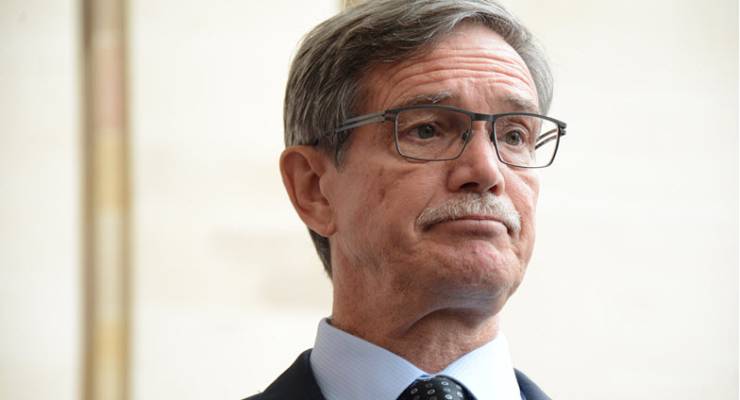
There can be few more depressing experiences in the working life of a politician than showing up for the first party room meeting after an electoral rout.
When Western Australia’s state Liberals last assembled on January 24 — to be told by the then premier, all too accurately, that their party was “not in a winning position” — there were 47 of them.
Yesterday, just 22 elected or potentially elected members assembled to pick up the pieces after the devastation of the March 11 election result.
The first order of business was to anoint Mike Nahan, former Treasurer and one-time executive director of the Institute of Public Affairs, to succeed Colin Barnett as leader.
Nahan emigrated to Australia from Michigan in 1982, and now joins Ohio’s Kristina Keneally on the shortlist of Australian politicians to have risen to party leadership status despite suffering the affliction of an American accent.
However, few expect he will sustain this distinction through to the 2021 election, by which time he will be approaching 71.
As such, the real question for the Liberal Party going forward is for whom Nahan is keeping the seat warm.
Among those who left the way clear for Nahan’s unopposed election was Liza Harvey, the former police minister who won promotion to deputy premier a year ago, and was recognised as Barnett’s favoured heir apparent.
Harvey featured prominently alongside Barnett during the campaign in a vain effort to give the government a fresh face — and also to promote a misleading image of gender balance for a party that could only count four women among the thirty-one members elected to lower house seats in 2013.
In explaining why she declined to put her name forward, Harvey emphasised the fact that her daughter is in her final year of high school — a factor that will notably cease to apply at the end of the year.
In slightly less unhappy circumstances, the leadership might instead have gone to Joe Francis, the former emergency services minister.
A former Royal Australian Navy submarine officer, Francis cut his political teeth as a staffer to Tony Abbott in the early days of his parliamentary career in the 1990s, and shares with his old mentor an aggressive political style that could prove highly effective in opposition.
He has also cultivated a distinctive image as a self-described “bogan”, and has been known to arrive at parliament with AC/DC blaring from his V8 ute.
However, Francis’s ambitions were scotched by his inability to defend an 18% margin in his southern suburbs seat of Jandakot, in the party’s single worst result of the election.
That’s unlikely to be the end of the matter though, as Francis is reportedly hopeful of succeeding Barnett when he vacates his seat of Cottesloe — which he ought to do very soon, in the forcefully expressed view of a number of his colleagues.
There are two reasons why this scenario is less than ideal, the first being that Francis is by no means a natural fit for the classically blue-ribbon western suburbs electorate and its prevailing demographic of high-income professionals.
One unidentified Liberal went so far as to tell Perth’s Sunday Times newspaper that Francis “looks like a thug”, and that there was “no way” he would win the support of the electorate’s voters or preselectors.
The second issue is the aforementioned gender problem, which is no less in need of addressing now than it was before the election.
This issue has raised its head before in the seat of Cottesloe, when Colin Barnett announced his intention to retire at the 2008 election after leading the party to defeat in 2005.
By the time Barnett was prevailed upon to reactivate his ambitions in order to save the party from the disaster of Troy Buswell’s leadership, a new candidate had been lined up in Cottesloe who ticked every relevant box — Deidre Willmott, then policy director and now chief executive at the Chamber of Commerce and Industry, and a former chief-of-staff to former premier Richard Court.
The reversal of Willmott’s preselection seemed to symbolise the problems the party was having in providing opportunities for talented women, and it was anticipated that the prospect of Cottesloe falling vacant again would provide a chance to right the earlier wrong (though Willmott distanced herself from the idea on election night).
However, that was at a time when the Liberal Party, while undoubtedly headed for defeat, was not expected to cop such a drubbing as to be left straining for immediate leadership options.
Under the circumstances it now faces, the party may conclude that less-than-ideal options are the only ones it has to work with.








Bah hah! And now the do nothing fed libs
Much if this goes back to your earlier piece on the tendency of single-member electoral systems to produce disproportional movements in seat numbers towards the winning party/coalition. Had the recent WA poll been undertaken using the MMP system of proportional representation, the government would be a Labor/Green alliance and the opposition Liberal Party could have preserved their leadership “talent” (if such can be applied to Joe Francis) by having them in safe spots on the party list. The government’s numbers would also have been significantly diminished with its overall majority in low single figures. This in turn would have meant a more effective opposition and a healthier democracy – IMHO at least.
Mike Nahan certainly looks every inch an executive director of the Institute of Public Affairs. Is that a big vote winner at the moment, anywhere in Australia?
Why doesn’t the rest of the country build a bogan proof fence and leave that massive waste of space to eat itself?